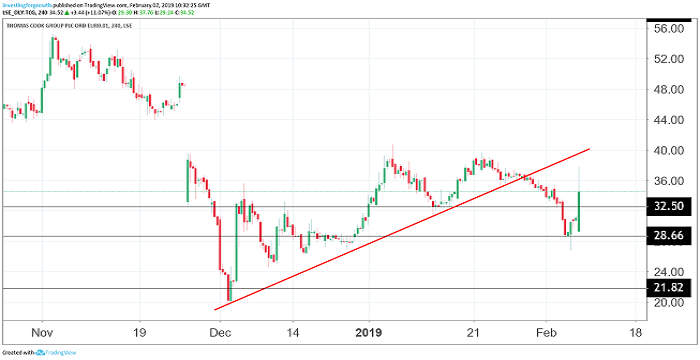This is why Thomas Cook shares just rocketed 20%
After a grim 2018, our head of equity strategy assesses the outlook for Thomas Cook after Q1 results.
7th February 2019 10:50
by Lee Wild from interactive investor
After a grim 2018, our head of equity strategy assesses the outlook for Thomas Cook after Q1 results.

Thomas Cook (LSE:TCG) lost even more this winter than the year before, but a strategic review of the airline business is food for the bulls.
Like-for-like revenue rose 1% in Cook's first quarter to £1.656 billion, but margins deteriorated and losses for the three months widened by £14 million to £60 million. Weak demand in the UK and Northern Europe hurt the holidays business, while the airline also lost money in the traditionally weaker quarter.
We're told the December bank covenant tests were met, but concerns over Cook's balance sheet will not go away. Net debt of £1,588 million is a millstone around Cook's neck, and it just does not have the money to make crucial and necessary improvements to the business.
If it wants more own-brand hotels, greater digital reach and a more efficient business, it has got to spend big. Current poor profitability and weak cash flow will not provide the warchest it needs.
This explains the rationale behind a much-needed strategic review of the airline operation. Cook says it will consider "all options", and this update certainly reads like a For Sale notice. Its 103 aircraft carried 20 million passengers last year, generated £3.5 billion of revenue and 37% growth in profit to £129 million. What am I bid?
Thomas Cook's share price was up almost 20% at one stage early Thursday, although this is in the context of an 85% decline since making a multi-year peak in May last year.

Source: TradingView, four-hour chart Past performance is not a guide to future performance
And there was certainly little else for bulls to hang their hat on in this update. Thomas Cook is still suffering the ill effects of last summer's UK heatwave, but despite all its problems, keeping full-year expectations unchanged is a welcome relief. There was a clear risk that two profit warnings late last year would become three.
However, last summer still gets the blame for a poor winter, and UK holidaymakers are holding off booking for this summer while the economic outlook and Brexit outcome remain uncertain.
Cook's decision to shrink airline capacity has had an inevitable impact, but the benefits of focusing on more upmarket hotels where margins are higher, and cutting costs further should feed through.
Cook has already sold a greater percentage of its summer holidays than at this time last year, but it has fewer breaks to sell. Lower capacity means bookings are down 12% but prices are 4% higher.
*Horizontal lines on charts represent levels of previous technical support and resistance. Trendlines are marked in red.
These articles are provided for information purposes only. Occasionally, an opinion about whether to buy or sell a specific investment may be provided by third parties. The content is not intended to be a personal recommendation to buy or sell any financial instrument or product, or to adopt any investment strategy as it is not provided based on an assessment of your investing knowledge and experience, your financial situation or your investment objectives. The value of your investments, and the income derived from them, may go down as well as up. You may not get back all the money that you invest. The investments referred to in this article may not be suitable for all investors, and if in doubt, an investor should seek advice from a qualified investment adviser.
Full performance can be found on the company or index summary page on the interactive investor website. Simply click on the company's or index name highlighted in the article.